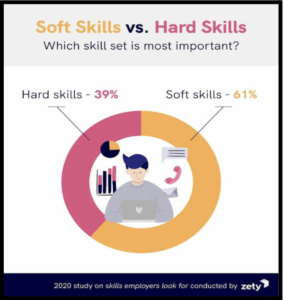“Hard skills” and “soft skills” are terms we all are used to hearing since high school. How important it is to acquire as many of them as possible. Hard skills nowadays are referred to as technical skills in the area of expertise we want a career in. Soft skills haven’t been the focus for a long time until recently they are referred to as “Transferable skills”. Light is being shed to the importance of these skills in our ever-changing, developing world.

The wikipedia definition to a transferable skill is an ability or expertise which may be used in a variety of roles or occupations.
My definition of transferable skills is that they are skills that allow you to be generalists in diverse fields. They are often called “portable skills” because you can bring what you’ve learned from one job, internship or volunteer work to another. You can apply these general skills to various fields, working environments, and industries. These are not easy skills and they can be uncomfortable at first,” Says the author of Skills: The Common Denominator, Asha Aravindakshan when we sat down and interviewed her on her perspective on transferable skills.
Leadership, a skill that in my opinion is a master of them and it’s the core of any organization.
“As young people, leadership may come in the classroom, student life, sports, and other extracurricular activities. AIESEC provides an opportunity for not only those students volunteering in the AIESEC chapters, but also the students that participate in the programming. It’s powerful to see students uplifting each other up in this way.” Says Asha.
It is also highly encouraged and developed within big firms & organizations such as PwC, where they have their own leadership training programs for their employees which was highlighted by Farah Oweis who’s the Regional Talent Acquisition manager at PwC Middle East when we sat down with her to discuss what transferable skills recruiters look for.
“You and your fellow AIESEC team members are gaining valuable transferable skills, including collaboration, dependability, and project management. For example, they may be an individual contributor at work, but a community leader outside of work — they could share stories and examples of how leadership in their community demonstrates that they are ready for a managerial role in the company.” says Asha.
Another transferable skill that can be used in different contexts is problem-solving. It is a valuable transferable skill because employers look to hire people who can help them find solutions. Yet a marketer will use these skills differently than a data analyst. The marketer may problem-solve how to bring a bigger audience to their site. The data analyst may problem-solve why revenue is down by digging through the results of past sales efforts. Both are using the same problem-solving skills but applying them differently.
A 2018 report by McKinsey & Company found that the need for transferable skills will increase markedly in the next decade, while the need for repetitive and manual tasks will decrease. Employers seek transferable skills in their staff because, in general, employees with transferable skills have the tools that help them go beyond their job description.
Now let’s see some examples of transferable skills (soft skills) you can use to frame or highlight your previous experiences and customize them for your new career trajectory or path.
| Communication | |||
| Facilitating group discussion | Interviewing | ||
| Providing appropriate feedback | Writing and listening | ||
| Negotiating | Perceiving non-verbal messages | ||
| Research and Planning | |||
| Forecasting and predicting | Creating ideas | ||
| Extracting important information | Identifying & solving problems | ||
| Analyzing Information | Defining needs & requirements | ||
| Interpersonal skills & Human Relations | |
| Developing Rapport with customers & colleagues | Providing support for others |
| Counseling | Delegating with respect |
| Asserting | Conveying feelings appropriately |
“Having a growth mindset, a positive attitude, and excellent communication skills, are transferable skills big firms such as PwC look for in fresh graduates. As they will easily fit and blend with the culture we have at PwC.” says Farah.
Obtaining a transferable skill is just the beginning, mastering the skill is what differentiates candidates during job interviews. “Practice makes perfect for learning a skill or upskilling. For students looking to be mindful of the soft skills of networking and relationship building in their routine life, they need to practice. These are not easy skills and they can be uncomfortable at first.” says Asha on how to master the transferable skills we have.
Let’s dig deeper on what Asha thinks of networking and relationship building. “For networking, I’ll be honest – I do not like networking receptions. I do like events with speakers. So I challenged myself to attend events with speakers, where I wanted to meet the speaker and ask a question. I would research the speaker before the event and write out my questions. Then at the event, I would sit in the front row, so when the speaker finished, I could meet them at the side of the stage to introduce myself and ask my question. It always worked, and built my confidence to network with senior executives.” says the author.
Now you may ask how do I include the right transferable skill for a job opportunity I wish to apply to. “Look closely at the job post to identify the main keywords recruiters will look for in your application.” says Farah. She also added that each job opportunity must have a personalized, tailored application. And that you should constantly update your skill set as you apply for different job opportunities, and the way to stand out is by knowing which transferable skills to use for each job opportunity.
“Apply and take advantage of every opportunity, scholarship, activities you have presented in front of you” said Farah when asked about one piece of advice she would give her 20 year old self.
Take Farah’s advice, participate, initiate, lead, and gain as many experiences, opportunities, and connections as possible. It is with experience we gain the transferable skills the workplace and the future needs.
 Farah Oweis – Linkedin
Farah Oweis – Linkedin
Farah is also a career strategist & coach, linkedin & CV writer, whose passionate about building successful teams.
 Asha Aravindakshan – Linkedin , Website, E-book
Asha Aravindakshan – Linkedin , Website, E-book
For further tips and information on how to best utilize and gain transferable skills that will help you level up your career, you will find below the link to Asha Aravindakshan’s book, Skills: The Common Denominator.
Written by: Hala Al-Kharabsheh
